And behavioral thera - Study guides, Class notes & Summaries
Looking for the best study guides, study notes and summaries about And behavioral thera? On this page you'll find 36 study documents about And behavioral thera.
All 36 results
Sort by
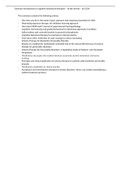
-
Summary for Introduction to cognitive behavioral therapies - Articles and book of Farmer & Chapman
- Package deal • 2 items • 2023
-
- $9.59
- 22x sold
- + learn more
Summary for Introduction to cognitive behavioral therapies - Articles and the book written by Farmer & Chapman (Behavioral interventions in cognitive behavior therapy) 2022-2023
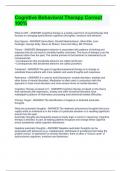
-
Cognitive Behavioral Therapy Correct 100% What is CBT - ANSWER Cognitive therapy is a widely used form of psychotherapy that focuses on changing dysfunctional cognitions (thoughts), emotions and behavior. Key Figures - ANSWER Aaron Beck, Donald Meichen
- Exam (elaborations) • 4 pages • 2024
-
- $10.99
- + learn more
Cognitive Behavioral Therapy Correct 100% What is CBT - ANSWER Cognitive therapy is a widely used form of psychotherapy that focuses on changing dysfunctional cognitions (thoughts), emotions and behavior. Key Figures - ANSWER Aaron Beck, Donald Meichenbaum, Albert Ellis, Leon Festinger, George Kelly, Steve de Shazer, Insoo Kim Berg, Bill O'Hanlon Theory - ANSWER Maladaptive behavior is associated with patterns of thinking and response that do not result in mentally healthy outcomes. ...
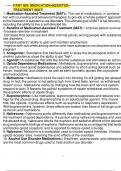
-
Part Six: Medication-Assisted-Treatment (MAT) 1. Medication-Assisted-Treatment (MAT):: The use of medications, in combination with counseling and behavioral therapies, to provide a "whole-patient" approach to the treatment of substance use disorders
- Exam (elaborations) • 2 pages • 2023
-
- $8.49
- + learn more
Part Six: Medication-Assisted-Treatment (MAT) 1. Medication-Assisted-Treatment (MAT):: The use of medications, in combination with counseling and behavioral therapies, to provide a "whole-patient" approach to the treatment of substance use disorders. The ultimate goal of MAT is full recovery, including the ability to live a self-directed life. 2. Benefits of Medication-Assisted-Treatment (MAT):: -Improve patient survival -Increase retention in treatment -Decrease illicit opiate use and o...
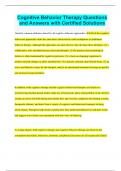
-
Cognitive Behavior Therapy Questions and Answers with Certified Solutions
- Exam (elaborations) • 15 pages • 2023
- Available in package deal
-
- $9.99
- + learn more
Cognitive Behavior Therapy Questions and Answers with Certified Solutions Identify common attributes shared by all cognitive behavior approaches. All of the cognitive behavioral approaches share the same basic characteristics and assumptions as traditional behavior therapy. Although the approaches are quite diverse, they do share these attributes: (1) a collaborative rela- tionship between client and therapist, (2) the premise that psychological distress is often maintained by cognitive processe...
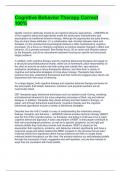
-
Cognitive Behavior Therapy Correct 100% Identify common attributes shared by all cognitive behavior approaches. - ANSWER All of the cognitive behavioral approaches share the same basic characteristics and assumptions as traditional behavior therapy. Alt
- Exam (elaborations) • 8 pages • 2024
-
- $9.99
- + learn more
Cognitive Behavior Therapy Correct 100% Identify common attributes shared by all cognitive behavior approaches. - ANSWER All of the cognitive behavioral approaches share the same basic characteristics and assumptions as traditional behavior therapy. Although the approaches are quite diverse, they do share these attributes: (1) a collaborative rela- tionship between client and therapist, (2) the premise that psychological distress is often maintained by cognitive processes, (3) a focus on ch...
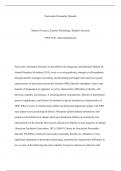
-
Narcissistic Personality DisorderMaster of Science, Forensic Psychology, Walden University
- Summary • 5 pages • 2024
-
- $7.99
- + learn more
FPSY 6720 Narcissistic Personality DisorderNarcissistic Personality DisorderMaster of Science, Forensic Psychology, Walden UniversityFPSY 6720: Abnormal BehaviorNarcissistic Personality Disorder As described by the Diagnostic and Statistical Manual for Mental Disorders 5th edition (2013), overt or covert grandiosity, attempts at self-regulation through attention and approval seeking, and fluctuating and fragile self-esteem are typical characteristics of narcissistic personality disorder (NPD). S...
![NRNP 6645, NRNP 6645N FINAL EXAM [NGN] NEW UPDATE QUESTIONS WITH ANSWERS](/docpics/4062391/65831b90e2761_4062391_121_171.jpeg)
-
NRNP 6645, NRNP 6645N FINAL EXAM [NGN] NEW UPDATE QUESTIONS WITH ANSWERS
- Exam (elaborations) • 96 pages • 2023
-
- $17.99
- + learn more
NRNP 6645 Final Exam The advanced practice psychiatric nurse encourages a patient with gambling addiction to develop a relapse prevention plan. Which of the following is true about a relapse prevention plan? Which of the following is consistent with the psychotherapeutic approach used by existential psychotherapists? According to Dearing, Stuewig, and Tangney (2005), understanding the difference between guilt and shame and its impact on an individual‟s motiv...
![NRNP 6645, NRNP 6645N FINAL EXAM [NGN] NEW UPDATE QUESTIONS WITH ANSWERS](/docpics/4062408/65831c74c65e8_4062408_121_171.jpeg)
-
NRNP 6645, NRNP 6645N FINAL EXAM [NGN] NEW UPDATE QUESTIONS WITH ANSWERS
- Exam (elaborations) • 96 pages • 2023
-
- $17.99
- + learn more
NRNP 6645 Final Exam The advanced practice psychiatric nurse encourages a patient with gambling addiction to develop a relapse prevention plan. Which of the following is true about a relapse prevention plan? Which of the following is consistent with the psychotherapeutic approach used by existential psychotherapists? According to Dearing, Stuewig, and Tangney (2005), understanding the difference between guilt and shame and its impact on an individual‟s motiv...
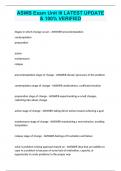
-
ASWB Exam Unit III LATEST UPDATE & 100% VERIFIED
- Exam (elaborations) • 34 pages • 2024
-
- $7.99
- + learn more
Stages in which change occurs - ANSWER-precontemplation contemplation preparation action maintenance relapse precontemplation stage of change - ANSWER-denail, ignorance of the problem contemplation stage of change - ANSWER-ambivalence, conflicted emotion preparation stage of change - ANSWER-experimenting w small changes, collecting info about change action stage of change - ANSWER-taking direct action toward achieving a goal maintenance stage of change - ANSWER-maintaining ...
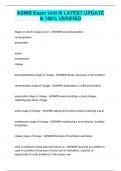
-
TX ADJUSTER TEST LATEST UPDATE & 100% VERIFIED.
- Exam (elaborations) • 34 pages • 2024
-
- $7.99
- + learn more
Stages in which change occurs - ANSWER-precontemplation contemplation preparation action maintenance relapse precontemplation stage of change - ANSWER-denail, ignorance of the problem contemplation stage of change - ANSWER-ambivalence, conflicted emotion preparation stage of change - ANSWER-experimenting w small changes, collecting info about change action stage of change - ANSWER-taking direct action toward achieving a goal maintenance stage of change - ANSWER-maintaining ...

Did you know that on average a seller on Stuvia earns $82 per month selling study resources? Hmm, hint, hint. Discover all about earning on Stuvia


